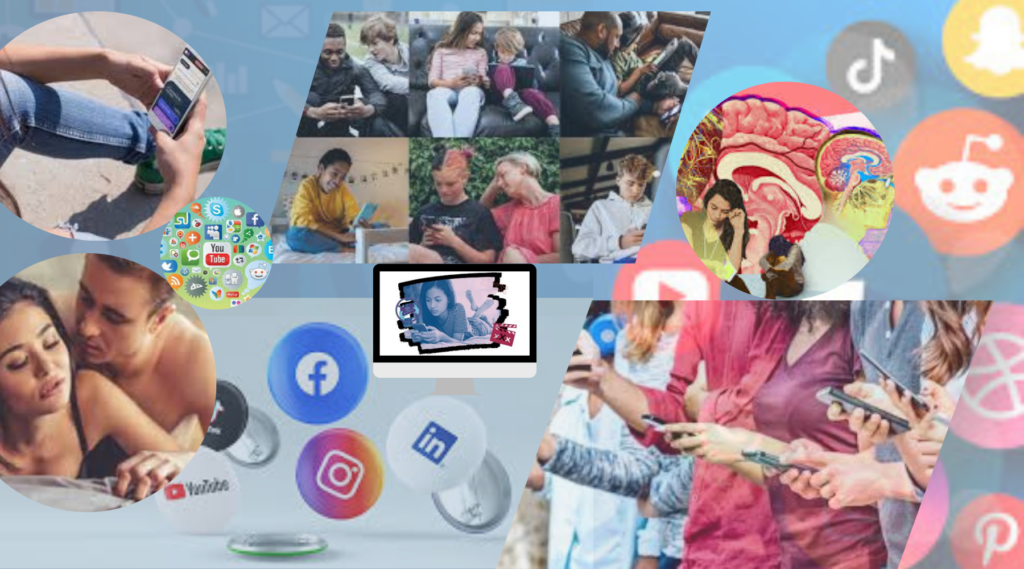- How many people worldwide are now online?
- What percentage of people in Poland have access to the internet?
- Which social media platforms are popular among younger users?
- How many hours did people spend on digital media daily in 2008?
- By 2018, how many hours per day did people spend on digital media?
- Approximately how many people struggle with social media addiction today?
- What is “fear of missing out,” and how does it affect internet users?
- How many people globally use dating apps, and which ones are the most popular?
9. How common is it for people to visit adult content sites in the United States?
10. What percentage of internet users played video games in 2022?
11. What negative effects can excessive internet use have on mental health?
12. During the COVID-19 pandemic, why did some people use social media more?
13. What link did the study find between social media addiction and sexual health?
14. Why is it important to educate young people about internet addiction?
Table of Contents
TogglePandemic Internet Use and Its Effects on Men's Sexual Health:
On social media sex habits are most prominent, In recent years, Internet use has grown rapidly, and now almost 7 billion people worldwide are online. In parts of Europe, like Poland, Internet access is widespread, with about 92% of the population connected. As more people use the Internet, activities like social media, online gaming, dating apps, and access to adult content have also increased. Today, around 79% of people worldwide use social media, with platforms like Instagram, Snapchat, and TikTok especially popular among younger users. Back in 2008, people spent about 2.9 hours a day on digital media; by 2018, this had jumped to 6.5 hours. Currently, around 214 million people struggle with social media addiction, and over a third of users experience “fear of missing out” when they’re offline.
Dating apps are now also widely available, letting people find romantic partners or meet new friends. Globally, there are around 282 million dating app users, with Badoo and Tinder being the most popular. Alongside this, Internet access has made adult content easy to find, with about 46 million Americans visiting adult sites regularly.
The gaming community has also expanded, with 69% of Internet users playing video games in 2022, up from just 7% in 2014. Today, gamers come from all demographics, including men and women equally. Researchers have found that too much Internet use can negatively affect mental health, with terms like “Internet addiction disorder” and “social networks use disorder” (SNUD) being used to describe these issues. SNUD is linked to symptoms like depression, anxiety, and social distress. Mental health and sexual health are closely connected, and the isolation during COVID-19 made this more evident.
Our study focused on how social media, gaming, and adult content usage affected men’s sexual health during the COVID-19 pandemic. We proposed that excessive Internet use, including social media, gaming, and adult content, could negatively impact sexual function.
Materials and Methods:
We surveyed 789 men aged 18-60 using a questionnaire shared on social media. The survey ran from May to July 2024 and was based on the International Index of Erectile Function (IIEF) and the Bergen Social Media Addiction Scale (BSMAS), along with sociodemographic questions.
The IIEF, with 15 questions, assesses male sexual health in five key areas. Erectile dysfunction is suggested when scores fall below 25 out of a possible 30 points. The BSMAS includes six questions that measure social media addiction risk, scored on a 5-point scale, with scores above 24 indicating higher addiction risk.
Only responses from sexually active men aged 18 or older who gave informed consent were included in the analysis. Our study was approved by the Bioethics Commission of Wroclaw Medical University. Statistical analysis was conducted using Statistica software to ensure data consistency and assess significant differences among responses.

Impact of COVID-19 on Social Media Use:
During the COVID-19 pandemic, many people felt isolated and lonely. This led to increased time spent on the internet and social media. For some, this heavy social media use became an addiction, which can lead to mental and physical health issues, including problems with sexual health.
Social Media and Everyday Life:
Social media is a large part of daily busy life. Platforms like Instagram and TikTok help people stay connected with friends and family. Beyond just communication, these platforms offer shopping, selling items, discounts, and ideas for cooking, home decor, fashion, and travel. Users also follow celebrities, old friends, and ex-partners, which often leads to comparisons. Many people post “perfect” versions of their lives, making others feel unhappy or inadequate. In our study, 1.6% of men showed high-risk social media addiction, and 8.83% felt their relationships were negatively affected by excessive social media use. We also found a link between social media addiction and poorer sexual health.
Adult Content and Sexual Health:
Watching adult content online has become common among adults. Nearly 90% of men in our study reported watching adult content, with 10% viewing it daily. Research suggests that men who rely on pornography rather than real-life intimacy may have a higher risk of sexual health problems, such as erectile dysfunction.
Use of Dating Apps:
Dating apps, like Tinder, are now popular tools for connecting with others. Tinder alone has billions of swipes daily. Although dating apps are often associated with casual relationships, many people use them to find friendships or long-term partners. In our study, 52.21% of men used dating apps, with 41.6% looking for love, 25.8% seeking a sexual partner, and 32.6% hoping to make new friends. However, men using dating apps tended to watch more adult content and had lower sexual health scores.
Gaming and Internet Use:
Video game use has risen sharply in recent years. In our study, 75.5% of respondents played video games, with popular choices being war, strategy, and arcade games. We found no clear link between gaming and sexual health issues, though.
Importance of Education on Internet Addiction:
Our study, conducted in Poland, was the first to explore how internet use (including social media, adult content, and dating apps) affects men’s sexual health. Excessive internet use appears to harm sexual health, especially since the pandemic. Health professionals should take internet addiction seriously, and schools should educate young people on the risks of excessive internet use. Programs should cover social media, adult content, and dating app use to inform young people about potential consequences.
Study Limitations:
There are some limitations to our study. Most of our respondents were young men, so results may not apply to all men. Since the data came from self-reported questionnaires, it may not be fully accurate. Pandemic stress and other health factors may also affect mental and sexual health. Finally, our study took place in Poland, where internet access is widespread, so results might differ in countries with limited internet access. Our questionnaire also didn’t address factors like diet or lifestyle, which could also affect sexual health.
Conclusion:
In conclusion, our study highlights the impact of excessive internet use, especially social media, dating apps, and adult content, on men’s mental and sexual health. The COVID-19 pandemic made this issue more pressing as people spent more time online to cope with isolation. We found that overuse of social media could lead to addiction, lower self-esteem, and potential sexual health problems. Similarly, frequent use of dating apps and adult content may also negatively affect relationships and sexual well-being.
This study is a reminder of the importance of understanding the effects of internet use and the need for educational programs to raise awareness about online addiction. Educating young people on healthy internet habits and the risks associated with excessive use is essential for mental and physical health. Although our study has some limitations, it provides valuable insights for health professionals and policymakers to help address these challenges.
FAQS:
- How many people are online worldwide now?
Almost 7 billion people are online globally. - What percentage of people in Poland have internet access?
About 92% of people in Poland have internet access. - What are some popular social media platforms among young users?
Instagram, Snapchat, and TikTok are popular with young users. - How many hours did people spend on digital media each day in 2008?
In 2008, people spent about 2.9 hours a day on digital media. - By 2018, how many hours were people spending on digital media daily?
By 2018, people spent around 6.5 hours on digital media each day. - How many people today struggle with social media addiction?
About 214 million people are affected by social media addiction. - What is the “fear of missing out”?
It is the feeling that people get when they worry about missing out on something happening online. - How many people use dating apps worldwide?
Around 282 million people use dating apps worldwide. - Which dating apps are most popular globally?
Badoo and Tinder are two of the most popular dating apps. - How many Americans regularly visit adult content sites?
About 46 million Americans visit adult content sites regularly. - What percentage of internet users played video games in 2022?
Around 69% of internet users played video games in 2022. - What can excessive internet use do to mental health?
Too much internet use can lead to mental health issues like anxiety and depression. - What is “Internet addiction disorder”?
It is a term used to describe addiction to internet use. - How are mental health and sexual health connected?
Good mental health supports sexual health, and stress can harm both. - How did COVID-19 affect social media use?
Many people used social media more due to loneliness and isolation during COVID-19. - Why do some people post “perfect” images on social media?
Some people post idealized images to show a “perfect” version of their lives. - How many men in the study showed signs of high social media addiction?
About 1.6% of men showed high-risk social media addiction. - What percentage of men used dating apps in the study?
Around 52.21% of men in the study used dating apps. - Why is internet addiction education important?
Education can help young people understand and avoid internet addiction risks. - What are some limitations of the study?
The study mostly involved young men and used self-reported answers, which may not be fully accurate.

Prof. Mian Waqar Ahmad, a dynamic force straddling the realms of academia and digital media. As a distinguished Lecturer in Information Sciences, he imparts knowledge within the academic sphere, igniting the minds of his students. Beyond the classroom, Prof. Mian Waqar Ahmad dons the hat of a seasoned blogger on Worldstan.com, where his insightful posts delve into the intricacies of information sciences. His digital footprint extends even further as a YouTuber, leveraging the platform to share his expertise and make complex concepts accessible to a global audience. Prof. Mian Waqar Ahmad’s journey embodies the fusion of traditional education and contemporary digital outreach, leaving an indelible mark on the evolving landscape of information sciences. Explore his world at Worldstan.com and witness the convergence of academia and the digital frontier.
